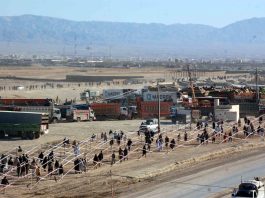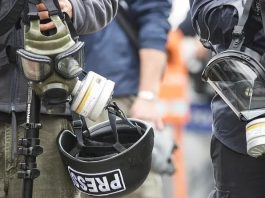
UMERKOT: The trauma of the family of an 11 year old girl raped by the headmaster (principal) of her school has brought a dark story to light.
The girl (her name is not disclosed under News Lens Pakistan’s Editorial and Ethical policies) is too small to understand the situation. Clinging to a quilt, the girl sobs, complaining of pain. She is scared of facing even her own parents.
Mushtaq Kunbhar, the headmaster of Bhawn Shah primary school in Umerkot, is accused of overpowering and raping the child on May 2 during recess. She was left in a pool of blood in the classroom.
A First Information Report had been filed against the headmaster on May 3 on the complaint of victim’s brother Rasool Bux at Ghulam Nabi Shah Police Station under section 376 (i) of Pakistan Penal Code.
Interviews with families have revealed that Mushtaq is whispered about among the students and their parents for allegedly fondling girls in school.
Fehmida, the rape victim’s sister, told News Lens Pakistan Mushtaq would draw curtains of the classroom during recess on the pretext of ‘checking copies.’ It was during one such recess that the rape of Fehmida’s sister happened.
In the absence of any system to register complaints against the teachers or schools’ general performance, the parents and the students failed to bring out the issue in public. Mushtaq alone teaches all the 23 girls enrolled in the school.
Javed, one of victim’s class fellows, paints Mustaq as a man who uses corporal punishment to reform kids at schools, incessantly hugs children when listening to their lesson, and makes indecent advances towards girl students. Javed told News Lens Pakistan that two years ago a girl named Meena Bheel quit school because of Mushtaqa’s behaviour.
The victim’s parents are not sure if they will be given justice. Previously all such cases had been hushed up.
As of now, the parents have stopped all the other girls from attending the school. They think the three-room school manned by six teachers is no longer a safe place for their girls.
The father of the victim, Menhal Kunbhar, repents today for sending his girls to the school. He told News Lens Pakistan that he was against sending her daughter to the school but agreed on the insistence of the very head master who is now accused of ruining his daughter’s life. He said he even convinced other members of the family to follow suit. “I wish I had not sent my daughter to schools,” the father said.
People in the area insist that the government should open a girl’s school in order to restore people’s confidence in girls’ education.
Education has never been considered important for girls in the rural areas. When teachers are found involved in molesting children, convincing parents to send their girls to school becomes more difficult.
The girls’ enrollment rate in Umerkot’s primary school is 44 percent, in Middle it is 10 percent while in High schools it drops to 5 percent.
This is not the first case of a child rape in Sindh or elsewhere in Pakistan being publicized, but it is rare. Previously in December 2012 a six-year-old girl was sexually assaulted in the town of Ghulam Nabi Shah in Umerkot.
In 2014 Madadgar National Hospital released its three year database on violence against children in Pakistan and reported 4,572 cases of rape with minor girls from January 2000 to December 2013. According to the Human Rights Commission of Pakistan 139 were gang-raped and 290 raped during 2014.
Many cases however go unreported and the tendency to blame the rape victim for the offense is a factor. Pakistani culture does not allow discussion on Child Sexual Abuse. The parents of the rape victim refrain from reporting the crime to the police fearing dishonour the revelation might bring to the family.
According to the Sahil Cruel Numbers Six Monthly Report 2014, 1,786 cases of child sexual abuse had been reported between January and June 2014 in Pakistan; 1,204 cases had been reported in the corresponding period in 2013.
Out of 1,786 cases reported in 2014, 1,172 involved girls (66 percent). Thirty-four percent of the victims fall within the age bracket of 6-15 years. Almost 1,200 of these cases were reported from the rural areas while 586 occurred in the urban cities.
Mushtaq is denying the accusation and says that the girl has concocted the story. His colleagues at school when contact by different NGO’s say that Mushtaq cannot commit such an act.
A culture of denial, wrapped in a misguided sense of political correctness is common in Pakistan says Abdul Haleem a human right activist.
Umerkot’s Police Chief Äbdul Qayyum Pitafi told News Lens Pakistan about the investigation team he has formed to probe the crime. The team led by DSP Ghulam Sarwar Babar has initiated the finding by sending a sperm sample from the accused and swabs from the victim to the laboratory in Karachi. The matter will be fully investigated, according to Pitafi, once the report arrives, which will take two to three weeks.
In Pakistan, the conviction rate of child abusers is not more than four percent.
Whether this case will ever be resolved only time will tell; however, the girl’s life will never be the same from now own, says Psychiatrist Dr Lakesh Kumar Khatri.
Post-Traumatic Stress Disorder (PTSD) is a common condition experienced by rape victims: “One cannot rule out nightmares, imaginary-pain emanating from the memories of the crime and low self-esteem in the victims’ life,” said Khatri.



